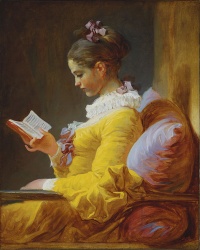User:Jahsonic/The reading experience
From The Art and Popular Culture Encyclopedia
|
"Cleland has slowed down time, in order to persuade the reader to share the imaginative experience. And this, of course, is precisely what Richardson had done in Pamela, and would do at even greater length in Clarissa. Dr Johnson went straight to the point when he said that if you read Richardson for the sake of the story, ‘your impatience would be so much fretted you would hang yourself. Richardson makes the assumption that Pamela and Clarissa become so real to the reader’s imagination that we want to linger. A century and a half later, Marcel Proust will carry the same assumption to extraordinary lengths, virtually persuading the reader to abandon his normal sense of time. No writer before the time of Richardson would have dreamed of attempting such a feat: Cervantes, Lesage, Defoe, all relied on a profusion of incident to hold the reader’s interest."--The Misfits: A Study of Sexual Outsiders (1988) by Colin Wilson |
|
Related e |
|
Featured: |
Why do we read? Reading is a solitary pleasure. It was mankind's favorite means to consume fiction from the mid 19th century until the arrival of sound film. Why do we read today, in the age of film, video games and home video?
- When we travel and have enough light to be able to read a story in a book in order to kill time.
- Reading a book because it is so good that it provides a unique experience that cannot be duplicated in any other medium (moving images, video games, …)
- Voyeurism is not just one of the primary tools of cinema, but of written fiction too
Do women and men have different reading habits?
See also
External links
- On the nature of 20th century reading experience[1]


